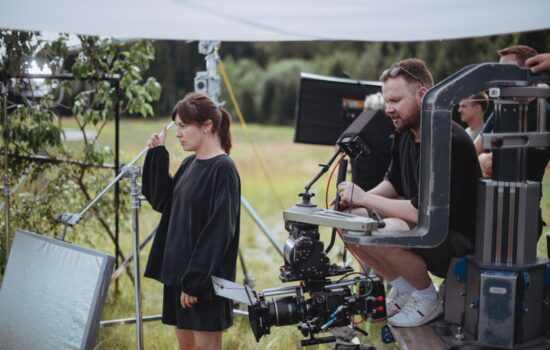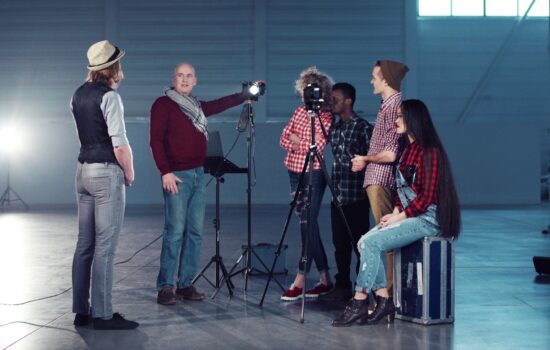Props Manager
Career Overview
The Props Manager acquires, organizes, and maintains all items that an Actor uses within a film. They source props from thrift shops and props houses.
Alternate Titles
Props Master, Property Master, Props
Avg. Salary
$59,0001

How To Become a Props Manager
People also ask
Career Description
The Props Manager oversees all the props on a production. Basically, a prop is defined as an object that an Actor uses in a scene, like a coffee cup. This can be particularly important in commercial work because the Props Manager is often handling the product.
Molly O’Connell has worked as a Props Manager on features, commercials, and short films in both Los Angeles and Colorado. She says, “It’s a process that spans from pre-production through principal photography. Much of it is an organizational job where the Props Manager and their team have to keep track of various items. It also requires a fine eye for detail.”
In pre-production, the Props Manager reads through the script and creates a list of every prop that will be used in production. Then they must work with the Set Decorator, Armorer and Production Designer to create a cohesive aesthetic and create a budget. After that, they source each prop, which can get creative.
While there are massive props houses, many items can be found in the everyday world at regular shops. Thrift stores are also a great place to find items. Many Props Managers are also on the lookout for unique items in their everyday life that could be good for future films.
After all items have been sourced, they need to be organized. When a call sheet is sent out for a day of shooting, the Props Manager gathers all the necessary items and brings them to set. They don’t want to lug everything on set every day. Once principal photography is finished, all rentals must be returned. Items that were purchased are either given to production or are kept by the Props Manager for future projects.
What does the Props Person do?
The Props Person oversees the props department and sees to it that each scene has the props necessary to flesh out the vision for the film. Depending on the size of the project, the Props Person may hire others for their department, assign the construction needs for it, and carry out other managerial responsibilities.
Salary
“Property Managers work freelance so there are no benefits and rates vary from job-to-job,” explains O’Connell. People should always make sure that they are getting paid at least minimum wage for working on set. A Props Manager can make up to $400 a day on a large shoot.
If a Props Manager develops the skill to make high-quality props then they can run a side business creating custom objects. This can be a good way to supplement income and network. Due to the freelance nature of this career, it is up to the individual to track down all payments and file taxes with the appropriate write-offs.
Hey, what do you think about trying our new Film Career HelperFilm Career Helper really quick? It’s totally free and could help get your career moving fast! Give it a try. It’s totally free and you have nothing to lose.
Career Outlook
Working as a Props Manager is to be a freelancer. O’Connell says, “Freelance definitely has its perks. I love the lifestyle of not having the daily repetitive grind of nine-to-five. It’s nice to have fluctuations.
There might be times where a Props Manager works hard for a long period of time, either because they’re on a long shoot, or jobs come in back to back. Also, they must chase down paychecks and create a savings system to float themselves when not working.
However, the main attraction is a Props Manager has some agency in who they work with and how much they work. Sometimes people will get staff jobs like building props or working in a props house. Those can be nice because that work is guaranteed pay but it limits what a person does. It’s a tradeoff. Finally, work can come at any time, literally. Independent projects usually shoot over the weekends due to the deals they get on equipment.”
People considering pursuing a career as a Props Manager should take note of the erratic hours and pitfalls that come with a freelancer’s life. If they like the field, but want more stability, then they should consider working in a props house or as a custom item builder.
The Props Manager works on set so they interact with everybody; however, their principal collaborators are the Art Director, Set Designer, Production Designer, and Production Assistants. When doing a commercial, the Props Manager also collaborates with the advertising agency’s Creative Director.
How do you become a Prop Manager?
Most individuals will work their way up to becoming a Prop Manager. This often means starting out as a PA or intern on a film and finding opportunities to work with existing props departments. With experience and expertise gained, they may then oversee the props on smaller productions such as shorts and student movies. Eventually, they can work on bigger budget films with more demanding prop needs.
Career Path
O’Connell states, “From my perspective, the most entry-level position in the Props Department is working in a coordinating position. They create spreadsheets and timelines for each individual prop. It is almost like an Assistant role. From there, a person can move into more hands-on work like buying or building props. In recent years, I’ve gone on to do more props styling for commercials and industrials. There is a whole world outside of film styling.”
If someone who loves props doesn’t like working on set, they can work in a props house and then move into a specialty shop. Basically, these shops take orders to create precise replicas of items or build things from sketches. This requires quite a bit of practice because if a production is going to spend hundreds of dollars on making a specific coffee cup it’ll most likely be used as a close-up within the film.
Everyone finds their own path for becoming a Props Manager. Different opportunities will be available due to demand, as well. “I happened to know the right person who knew I was interested. I was coming out of an internship and got hired then built my resume from there,” explains O’Connell.
Her approach was more of the indie way. In that route, a person works on smaller projects as a Props Manager and builds their resume so that they can work on larger productions.
Another way to do it that is more accessible in heavy production cities is to work in a props house or design shop and develop relationships with the customers. Art Directors will hire those people as Buyers and Assistants. Once working in the Art Department on set, an individual can develop relationships and slowly climb the ranks through hard work to becoming a Props Manager by learning from people with more experience.
Different approaches work for different personalities and they’re not mutually exclusive. The job is freelance so a lot of people will work on larger sets as an Assistant or Props Handler and as a Props Manager on smaller shoots.
- Make movies with friends to build a resume and get experience.
- Begin hoarding props. Get a storage unit and stockpile interesting items that can be used for
future shoots. It’ll save time and energy later. - Learn where thrift shops are and go to them. It’s a great place to find things in good
condition that won’t need to be treated to look like they were used. - Wander through props houses. Many have unique items and specialize in different things.
Experience & Skills
There are two major skill sets described by O’Connell that are necessary for becoming a Props Manager.
She says, “It’s crucial to have computer skills for presenting ideas and organization. Understanding how to use spreadsheets, along with Google docs and other collaborative tools, is a huge time saver. They also help a Props Manager delegate efficiently. Other necessary skills all have to do with having an art background.
“A Props Manager should be good with their hands, able to sculpt, build, and draw. They may find themselves having to make candy look like drugs or painting an object on the fly. These on-the-job quick fixes are what separates professionals from amateurs.”
If a person has a strong background in arts and crafts then they’ll have a lot of the necessary skills required to work in the Props Department. Another great skill is to be able to thrift shop. These skills can be improved with practice and different tricks will be learned by working with various Props Departments and Production Designers.
Working on a film set means being thrust into a high-stress environment. O’Connell says, “It helps to be cool under pressure. If a person freaks out they won’t get anything done. It involves teamwork but it’s really the ability to take direction and be okay following orders. Having problem-solving skills and being resourceful will put someone ahead of the curve.
The ability to take ownership of responsibility will inspire people to rehire. Out of everything, though, a person must be okay with change. Things are constantly in flux and those who adapt survive. Sometimes a Props Manager will spend days building or finding a specific item and then that scene or moment will get cut. They’ve got to be able to let it go.”
The characteristics O’Connell mentions are essential for success. A Props Manager is the head of a department and must be able to take responsibility, solve problems, be collaborative and adapt to whatever the scene requires.
What skills do you need to be a Prop Manager?
The skills required to be a Prop Manager are multifold. First, a Prop Manager must have impeccable organizational skills to properly maintain the props department. Second, they must understand the prop needs for each scene in terms of historical accuracy and functionality. Third, they must have construction and craftsmanship prowess to create the props needed for each scene.
Education & Training
“Training in film school is a good way to meet contacts and put yourself out there in that role. At the end of the day, getting hired is often about who you know. If this job comes up and you’re available then you can get hired. You always need to let people know when you’re available and interested,” suggests O’Connell.
“Internships are good. They give real-life experience. I went to school in Colorado so my school hooked me up with one, which can be crucial for networking in a small market. If someone is living in a place like LA they can get a job as a Production Assistant and then move into the props department. I also value workshops. They’re a good place to meet like-minded people to get direction and real information.”
Experience is integral to getting better at being a Props Manager. It doesn’t matter whether education comes from working on set or an academic setting as long as learning is taking place.
Additional Resources
O’Connell advises, “There are Facebook groups where people will ask questions on how to make specific items. It’s good to just search for what’s near. Also, take advantage of Instagram by looking for handles of specific Props Managers. A lot can be learned that way and it’s a good way to collect visuals and ideas.”
IASTE Local 44 is the LA-area Property Managers’ union. They also represent Props Handlers and Builders. On their website are links to educational sites and info on what is required to join the union.
It can also be good to treat props houses as a sort of club. Hanging out at them is a good networking opportunity for meeting people who are working and could potentially hire for future jobs.
Remember, this is a hands-on job so a lot of it involves making use of online resources and groups for a person to improve their skills. That could mean practicing on their own or networking to be an Assistant and getting experience with props that way.
FAQ
What is the single biggest suggestion you would give to someone wanting to get into this career?
“The biggest suggestion for someone who wants to become a Property Manager is when they are starting out, even as a PA, to let people know they’re interested in being part of that department. It doesn’t mean for them to be a know-it-all or declare that they are a Props Manager working a lower position but to simply say that they are interested in working Props.
“That way, when the Art Department is pulling PAs or looking for Assistants that person will be more likely to get the opportunity. It’s also good to ask questions when appropriate and find a mentor. It’s a small pool of people who are constantly working and collaborating so while breaking in can be tough it isn’t impossible. The best way for someone to do it is to be nice and let people know that they are interested.”
What’s the #1 mistake people make when trying to get into this career?
“The biggest mistakes that beginners, and even veterans, make involves set etiquette, especially when it comes to giving an opinion. The best way to learn how to act is to start out as a Production Assistant. Keep your mouth shut and observe.
“Producers hire someone to perform a specific task and it’s a high-stress environment where a lot of money is getting spent. That doesn’t mean a person shouldn’t be friendly but it’s important that they don’t blabber and are always where they need to be for each setup.
“Nothing is more embarrassing than when the whole set is ready to go and the 1st Assistant Director starts yelling for props. It’s stuff like this that gets a person fired and there is always someone ready to take their place.
“When someone works with a crew for a while or it becomes the twelfth hour of shooting it can be easy to forget set etiquette but it’s those breaking points that are remembered and can stop a rehire in the future.”
What is the question people should ask about this career but rarely do?
“What makes something a prop?
“A prop is an item that an Actor holds in their hand and uses on set. Set decorations are items that are in the background. The lines can get blurry, especially when it comes to costuming. For example, if someone is wearing glasses they can be an accessory but also a prop.
“What’s important is for the Property Manager to have a meeting with the Production Designer and Costume Designer in pre-production to work out what items are needed. They will be meeting anyway to create a unified aesthetic and if the extra time is taken to go through each item that could be a prop then things won’t slip through the cracks.”
What is one thing I should have asked which I didn’t?
“What are the most frustrating parts of the career?
“It can take a lot of time locating or building a specific prop, especially if the movie is a period piece. The level of personal investment that goes into each object is quite high. One day, the Props Manager may discover that that scene got cut. It can be extremely frustrating but that’s part of the deal.
“It’s the responsibility of the Property Manager to make sure that everything is sourced even if some of those items will get cut. It’s still fun but that’s the most frustrating part.”
If you could describe in one word what makes you successful, what would it be?
“Persistent.”
Sources

Molly O’Connell
Molly O’Connell is a Denver, CO and Los Angeles, CA-based Property Manager who has worked on various commercials, music videos, short films, and features.
She is the Owner and Creative Director of video production company Milk & Honey Media. Some of her past credits include “Like the Moon” by Future Islands, The Bungaloo: Great Divide Artist Series, Mountain Standard: Outdoor Clothing, Winter Session: Hand Crafted Bags, Blue Moon Digital, and Those Who Can’t.
References
- 1. "Hollywood Salaries Revealed, From Movie Stars to Agents (and Even Their Assistants)". The Hollywood Reporter. published: October 2, 2014. retrieved on: April 13, 2020



















